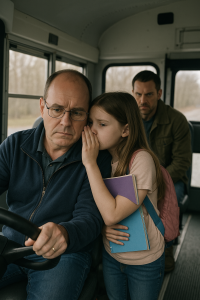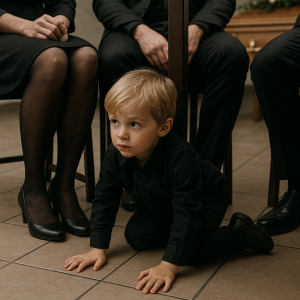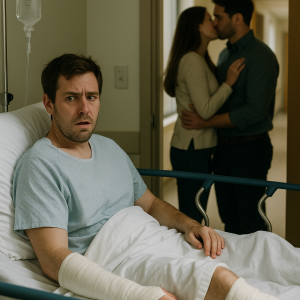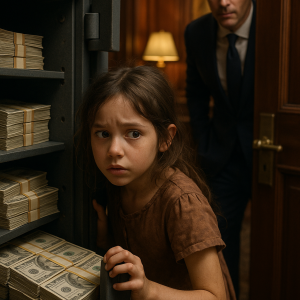The day began like any other in the bustling downtown streets of Chicago. The rising summer heat shimmered off the pavement, blurring the edges of tall buildings as if the city itself were caught in a mirage. Cars honked, people rushed with takeaway coffees in hand, and the rumble of engines filled the air with an impatient rhythm.
Behind the wheel of Bus 27 sat Michael Harris, a seasoned driver in his early fifties. His uniform shirt clung lightly to his back, and with one practiced hand he adjusted his collar, the other gently pressing the brake as he eased the vehicle toward the corner of 12th and Lincoln.
To most, this was just another weekday morning. For Michael, it was another routine shift — another circuit through the heart of the city, picking up workers, students, and tourists along the way. He told himself he’d done this a thousand times. Nothing unusual.
But deep down, he knew that instincts never retire. Before becoming a bus driver, Michael had served twelve years as a police officer. Though he had traded in his badge and gun for schedules and timetables, the sharpness of his training — that sixth sense for danger — still lived inside him, humming quietly under the surface, waiting for the right moment.
That moment arrived the second the doors of his bus hissed open.
The Man and the Girl
The first passenger to step aboard was a tall, wiry man. His face was angular, his movements clipped and hurried. His eyes swept across the bus with too much alertness, scanning not like a commuter but like someone calculating. Something in his demeanor struck Michael immediately — a stiffness that seemed rehearsed, not natural.
And then came the girl.
She climbed the steps slowly, her tiny frame nearly swallowed by a hoodie two sizes too large. Her shoulders were hunched, her gaze fixed on the floor. Each motion seemed uncertain, hesitant, as though she needed permission just to exist in that space.
What unsettled Michael most wasn’t just her silence, but the grip the man had on her wrist. Not a guiding hold, not the protective gesture of a father — but a grip of ownership, firm and controlling.
Michael didn’t say a word. He simply lifted his eyes to the rearview mirror, following the pair as they made their way to the back of the bus. The man tugged the girl into the corner seat. The chatter of other passengers filled the bus — headphones, conversations, the usual morning chaos. To everyone else, nothing seemed out of place. But to Michael, the air inside the bus grew heavy, like a storm cloud pressing down.

The Whisper That Changed Everything
At first, Michael told himself to focus on the road. He’d seen unusual passengers before — nervous children, strict parents, odd pairings. But this… this was different. The man was too rigid. The girl too silent.
And then it happened.
As the bus rumbled through the next block, Michael heard it. A sound so faint, he almost believed he imagined it.
“Please… help me.”
Three words. Barely audible. A whisper that trembled in the space between breaths.
Michael froze. His eyes shot to the mirror. He caught the girl’s reflection — her lips barely moving, her eyes still locked on the ground. The man beside her didn’t notice. No one else reacted.
But Michael had heard. And in that instant, the world slowed down.
Those three words rearranged the meaning of the morning. This wasn’t a child being shy. This wasn’t routine. This was danger. This was urgent.
A Calm Plan in a Storm
Years of police work had taught him one truth: panic makes things worse. If he startled the man, if he confronted him too directly, the situation could spiral out of control — and the little girl might suffer most.
Keeping his face neutral, Michael reached toward the radio clipped to his dashboard. His voice was steady, casual, trained:
“Control, this is Bus 27. Got a minor mechanical issue. Pulling over at the next stop.”
The dispatcher’s voice crackled back: “Copy, Bus 27. Need assistance?”
“Yes,” Michael replied smoothly. “Send a patrol unit.”
To anyone listening, it sounded like a routine maintenance call. But for those who wore the badge, the message was clear. Michael had once been one of them. He knew the language.
The Stop That Wasn’t Routine
The bus rolled forward another block before slowing to a halt outside a small coffee shop. Michael flicked on the hazard lights and turned to address the passengers.
“Sorry, folks. Little hiccup with the bus. Just a quick stop, won’t be long.”
Groans rippled through the crowd. People checked watches, muttered about being late, and some stood to stretch their legs. But Michael’s eyes stayed locked on the mirror.
The tall man’s jaw tightened. His grip on the girl’s wrist grew visibly stronger. “What’s the problem?” he snapped.
“Routine check,” Michael answered calmly. “Nothing to worry about.”
But the man didn’t relax. If anything, his suspicion deepened.
Red and Blue Salvation
And then — like a quiet promise delivered at the perfect time — red-and-blue lights flickered against the glass storefront outside. A patrol car pulled up, its engine barely making a sound. Two officers stepped out, their approach calm, practiced, deliberate.
Michael released a slow breath. Help had arrived.
He opened the bus doors and greeted them with casual ease. “Morning, officers. Glad you’re here,” he said, tilting his head just enough to guide their attention to the back.
The officers understood instantly.
One strolled casually toward the man, asking about his ticket. The other crouched slightly near the girl, meeting her downcast eyes with a gentle, steady gaze. She didn’t speak again, but she didn’t need to. The silent plea in her expression told them everything.
Within moments, the man was in handcuffs, escorted off the bus in stunned anger. The girl was led forward carefully, the officer’s hand light on her shoulder, guiding her to safety.
As she passed Michael, she finally lifted her face. Her voice was just above a whisper.
“Thank you.”
Michael’s throat tightened. He nodded, his own voice steady though his chest swelled with emotion. “You’re safe now.”
After the Storm
Passengers buzzed with confusion, whispering and speculating, but Michael barely heard them. His heart still pounded, the echo of her trembling words lodged deep in his chest.
He realized how close he had come to ignoring it. How easy it would have been to dismiss the whisper as nerves or imagination. But he hadn’t. He had listened.
And because he listened, everything had changed.
Later, after the formal statement with police and the confirmation that the girl was safe in child services’ care, Michael sat alone in the bus. The city outside carried on, oblivious. People hurried, cars honked, the sun climbed higher. Life, as always, went on.
But Michael knew better.
Sometimes an entire world shifts on the smallest things: a glance in a mirror, a whisper in the air, three fragile words that might otherwise vanish into noise.
He looked at his hands gripping the wheel. For the first time in years, he felt the quiet truth of his calling. Driving a bus wasn’t only about timetables and routes. It was about people. It was about noticing the things others missed. It was about listening.
As he eased the bus back into gear, ready for the next ride, Michael understood: this day was not routine.
Because sometimes, the tiniest voices carry the loudest truths.









